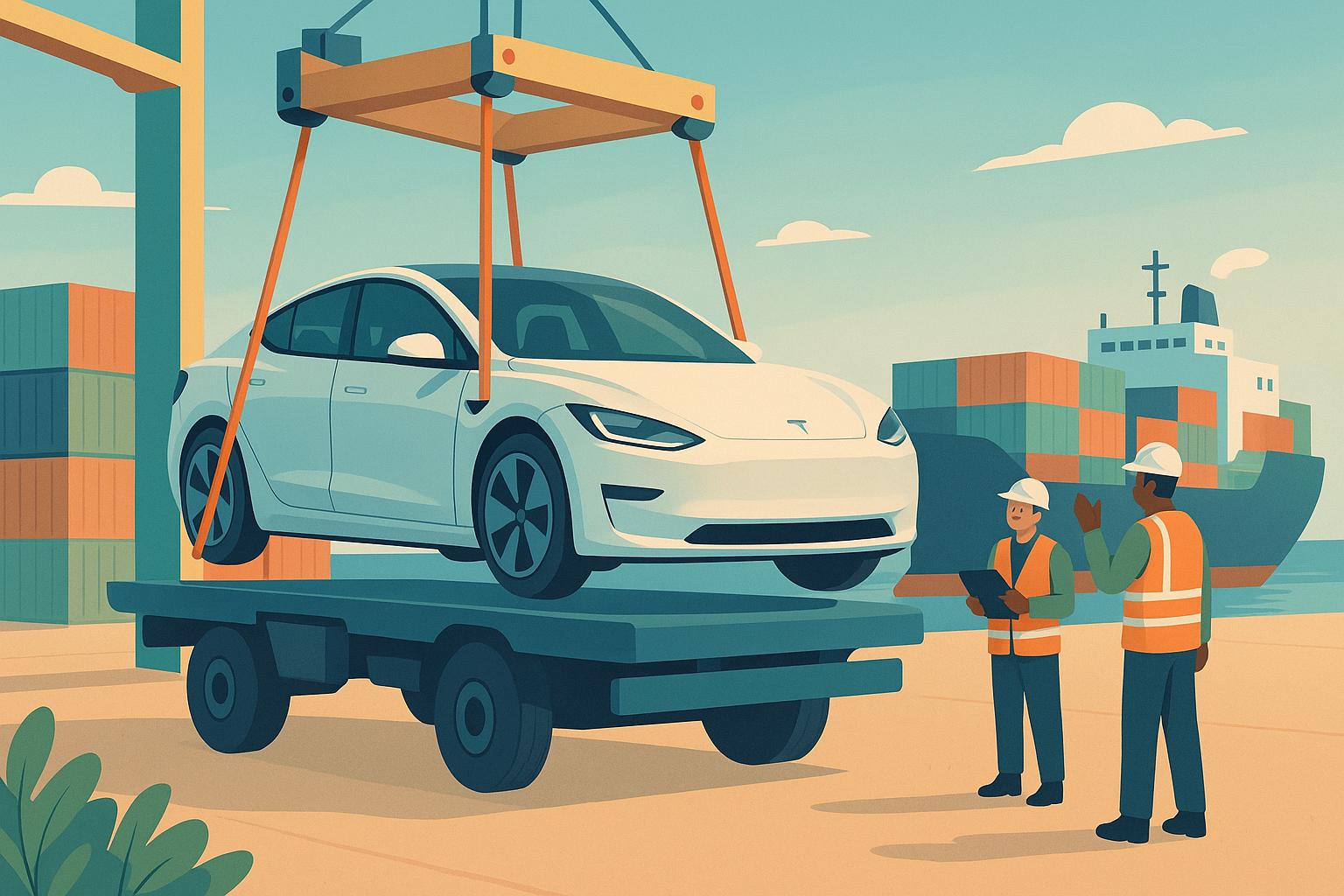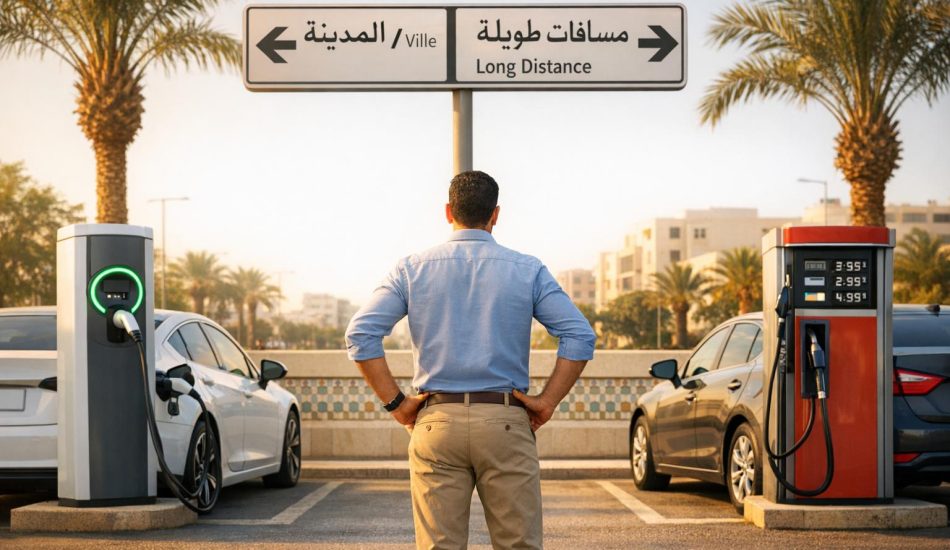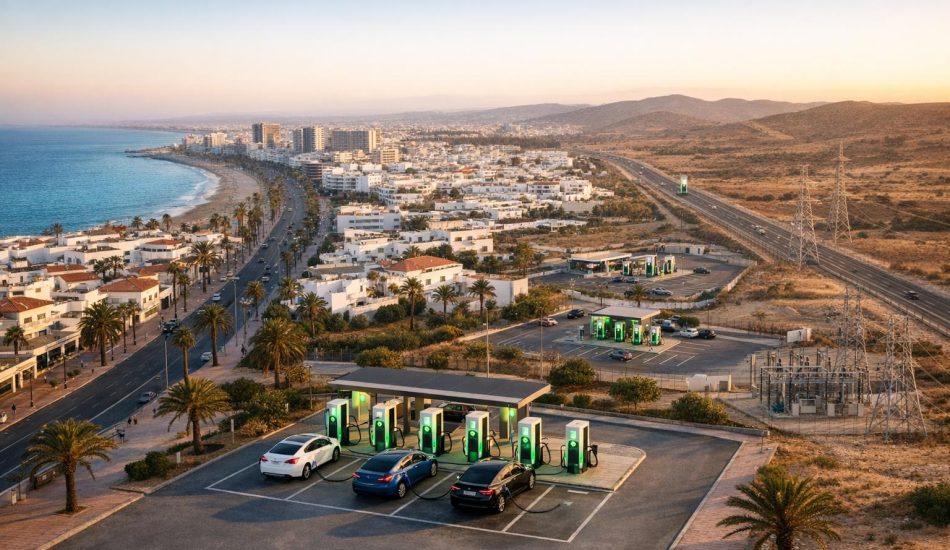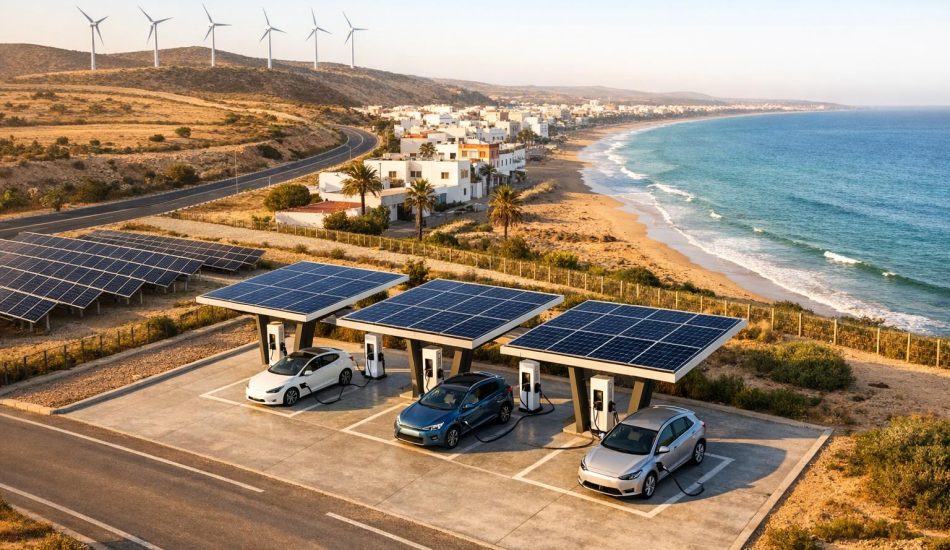
Importing an electric vehicle (EV) to Africa can be a smart choice, but it requires understanding costs, regulations, and logistics. Here’s a quick summary:
- Costs: Import taxes, shipping fees ($1,200–$2,500), and other expenses vary by country. For example, South Africa imposes a 25% import tax, while Ethiopia offers reduced tariffs and tax exemptions.
- Rules: Countries have specific age limits for vehicles (e.g., 3 years in Seychelles, 10 years in Ghana). Documentation like purchase invoices, export certificates, and inspection reports is essential.
- Shipping Options: Choose between RoRo (cheaper) or container shipping (better protection).
- Challenges: Limited charging infrastructure (only 17% of African countries have more than 10 public charging stations) and customs delays are common.
- Top EV Models: Affordable options like BYD Yuan Pro ($10,880) or premium models like BYD Atto 3 ($47,500) are tailored for African conditions.
Quick Comparison: Import Costs by Country
| Country | Import Tax | Vehicle Age Limit | Charging Infrastructure |
|---|---|---|---|
| South Africa | 25% | None | Limited |
| Ethiopia | 15% | None | Emerging |
| Ghana | Varies | 10 years | Limited |
To succeed, research local regulations, plan for costs, and ensure your EV meets technical standards. Focus on countries with favorable policies like Ethiopia for lower costs and easier imports.
How Taxes Might Affect Chinese EVs Adoption in Africa
Import Rules by Country
Understanding the documentation and compliance requirements for importing electric vehicles (EVs) into different countries is essential.
Key Regulations by Region
South Africa enforces strict rules for vehicle imports. EVs face a 25% import tax, higher than the 18% tax applied to conventional vehicles. However, vehicles imported from the European Union benefit from a 7% tax reduction under an existing Free Trade Agreement.
Here’s a breakdown of South Africa’s import costs:
- Customs duty: 30% of the vehicle’s value
- VAT: 15% of the vehicle’s value, including shipping costs
- Ad valorem tax: Calculated at a variable rate based on the vehicle’s value
Other African nations also impose restrictions, particularly on vehicle age:
| Country | Vehicle Age Limit |
|---|---|
| Chad, Seychelles, Mauritius | Maximum 3 years |
| Senegal | Maximum 4 years |
| Libya, Tunisia, Kenya | Maximum 5 years |
| Guinea, Cameroon | Maximum 8 years |
| Ghana, Eritrea | Maximum 10 years |
| Niger, Uganda | Maximum 15 years |
Once you understand these tax and age requirements, collect the necessary documents to comply with local regulations.
Required Documents
"It’s not about any differentiation between internal combustion vehicles and electric vehicles, but about our free trade agreements."
You’ll need the following documents for EV imports:
- Purchase invoice showing vehicle details and price
- Export certificate from the country of origin
- Bill of Lading (BOL)
- Vehicle inspection certificate
- Insurance documentation
- Customs clearance forms
- Personal identification
After gathering these documents, confirm that your EV adheres to the technical standards of the destination country.
Meeting Local Requirements
Technical standards vary by region. In South Africa, vehicles must be right-hand drive and pass specific roadworthiness tests. The National Regulator for Compulsory Specifications (NRCS) oversees the approval process for imported vehicles.
Emission standards also differ across countries:
- Morocco: Euro IV standards for new vehicles
- Nigeria: Euro III standards with a 15-year age limit
- Rwanda and Botswana: Euro III standards with no age limits
- Ghana: Euro II standards with a 10-year age limit
Additionally, ensure your EV meets local charging infrastructure requirements. Currently, only 17% of African countries have more than 10 public charging stations.
Import Costs Explained
Understand the expenses involved in importing your electric vehicle (EV) to Africa.
Shipping Fees
Shipping your EV from the U.S. to African ports typically costs between $1,200 and $2,500 per vehicle. The price depends on factors like the size of the vehicle, the shipping method (RoRo is more affordable, while container shipping provides additional protection), and the port of departure (East Coast ports are generally cheaper than those on the West Coast).
You’ll also need to account for marine insurance. This adds 1.75% of the vehicle’s value to the total cost. For instance, insuring a $40,000 EV would cost about $700.
Import Process Steps
Buying Your EV
Start by selecting your electric vehicle on EV24.africa. The platform features options from Tesla, BYD, Volkswagen, and Mercedes-Benz. Keep these points in mind:
- Vehicle Documentation: Make sure you have the original title, manufacturer’s certificate, and a vehicle history report.
- Technical Specifications: Double-check that the vehicle is compatible with your local charging infrastructure.
- Warranty Coverage: Confirm whether the international warranty can be transferred.
Once you’ve chosen your vehicle and gathered the necessary documents, it’s time to plan the shipping process.
Transport Planning
You can choose between two main shipping methods:
| Shipping Method | Best For |
|---|---|
| RoRo (Roll-on/Roll-off) | A budget-friendly option for standard vehicles. |
| Container Shipping | Provides added protection, ideal for luxury EVs or shipping multiple vehicles. |
Work with your shipping provider to handle the following:
- Schedule the vehicle pickup from the seller.
- Decide between port-to-port or door-to-door delivery.
- Arrange for transit insurance to protect your shipment.
- Monitor the shipment’s progress with tracking tools.
Once shipping is arranged, the next step is clearing customs and preparing for delivery.
Customs and Delivery
The final steps in the import process include:
-
Documentation and Inspection
Submit the required documents, including the bill of lading, commercial invoice, certificate of origin, import permit, and registration papers. Your EV will also undergo a VIN inspection and technical check to ensure it meets local standards. -
Final Delivery
After customs clearance, organize the final delivery. Complete the local registration process and set up charging at your location to get your EV road-ready.
sbb-itb-99e19e3
Solving Common Problems
Reducing Costs
Ethiopia has recently introduced policy changes that reduce costs by removing VAT, consumption, and surplus taxes. Import duties for EV parts are now set at 5%, while fully assembled EVs face a 15% tariff – down from the previous 35%.
Here are some ways to cut import expenses:
| Strategy | Benefit |
|---|---|
| Choosing Ethiopia | Advantageous tax policies for EV imports |
| Special Financing | 10% interest rate helps achieve cost parity in the first year |
| Bulk Importing | Lowers the cost per unit |
| Timing Imports Strategically | Off-peak seasons can reduce overall costs |
"The Ethiopian Ministry of Finance has slashed import duties on electric cars, buses, and trucks."
Once costs are addressed, it’s essential to plan for potential transit delays.
Handling Delays
Customs delays can lead to extra storage fees and other expenses. To avoid these, consider the following steps:
-
Before Arrival
- Ensure all documentation is complete and submitted ahead of time.
- Double-check paperwork for accuracy.
- Prepare duty payments in advance.
-
During Transit
- Monitor shipment progress closely.
- Stay in constant communication with your freight forwarder.
- Respond quickly to any requests for additional documents.
-
After Arrival
- Use a customs broker to expedite clearance.
- Address any compliance issues immediately.
- Retrieve your vehicle promptly to avoid storage fees.
These proactive measures can help manage delays effectively.
Meeting Standards
Ensuring your EV meets local regulations is crucial. Partnering with experienced logistics providers can simplify this process. They assist with:
- Verifying technical compliance
- Confirming safety certifications
- Ensuring adherence to local environmental regulations
- Completing vehicle registration
- Securing necessary import permits
"With the recent changes in Ethiopia’s import laws, it’s more important than ever to work with a company that understands the local regulatory environment."
Best EVs to Import
Top EV Models
Here are some EV options from EV24.africa that balance affordability, reliability, and features tailored for African conditions:
| Model | Price Range | Key Features |
|---|---|---|
| BYD Yuan Pro | $10,880 | Compact SUV with a great range for its price |
| Leapmotor T03 | $9,500 | Small city car, perfect for urban driving |
| Dongfeng NanoBox | $8,300 | Affordable option for short daily commutes |
| Geely Geometry A | $31,500 | Premium sedan with extended range capabilities |
| BYD Atto 3 | $47,500 | Packed with advanced tech and built to last |
These EVs are designed to handle the challenges of African roads and climates. Review the options carefully to find the one that fits your needs and budget.
How to Choose an EV
When picking the right EV, keep these factors in mind:
-
Range Needs
Think about how far you drive daily and the availability of charging stations nearby. Most EVs today can travel 150–300 miles on a single charge, but real-world range depends on factors like weather, road conditions, and driving habits. -
Charging Infrastructure
Check what charging options are available in your area. Many EVs now support multiple charging standards, making them easier to use across different regions. -
Ground Clearance
If you often drive on rough or uneven roads, look for a vehicle with higher ground clearance to avoid damage and ensure smoother rides. -
Parts and Maintenance
Choose brands with a solid presence in Africa. This ensures easier access to spare parts, skilled technicians, and reliable service.
Conclusion
Key Phases of Importing an Electric Vehicle
Importing an electric vehicle (EV) to Africa involves several important steps that require careful attention:
| Phase | Key Actions |
|---|---|
| Selection | Pick an EV model and confirm its specifications. |
| Documentation | Collect necessary import permits and compliance papers. |
| Shipping | Arrange transport via RoRo or container shipping. |
| Customs | Clear customs and pay duties and taxes. |
| Registration | Complete the local registration process. |
Make sure all your documents are in order and choose the best shipping method for your needs.
What to Do Next
- Look into local regulations, including age restrictions and technical requirements.
- Calculate the full cost, including the EV price, shipping, duties, and additional fees.
- Decide on the best logistics option – port-to-port or door-to-door shipping.
FAQs
What challenges might I face when importing an electric car to Africa, and how can I overcome them?
Importing an electric car to Africa can come with a few key challenges, such as understanding complex import regulations, managing customs duties, and coordinating shipping logistics. Each country may have its own specific requirements, so it’s essential to research the rules and policies in your destination.
To overcome these challenges, start by gathering all necessary documentation, including invoices, proof of ownership, and compliance certificates. Work with a reliable shipping company to handle transportation and ensure your vehicle meets local standards, such as emissions or safety requirements. For landlocked countries, plan for efficient overland transport from nearby ports to avoid delays and additional costs. Proper preparation can help streamline the process and make importing your electric car much easier.
What are the import taxes for electric cars in African countries, and which ones have the most favorable policies?
Import taxes for electric cars vary widely across African countries, depending on local policies and trade agreements. For example, South Africa applies a 25% import tariff on passenger vehicles, but reduced duties may be available for imports from Southern African Development Community (SADC) countries if local content requirements are met. It’s important to confirm the latest regulations with customs authorities before importing.
Some African nations are beginning to promote EV adoption by offering more favorable conditions. While specific examples in Africa may vary, globally, countries like Indonesia and Malaysia have temporarily waived or reduced import taxes on electric vehicles to encourage their use. Checking the current tax rates and incentives for your target country is essential to estimate costs accurately and ensure compliance with local rules.
What documents do I need to import an electric car to Africa, and how can I meet local regulations?
To import an electric car to Africa, you’ll typically need the following documents:
- Purchase invoice
- Export certificate
- Bill of lading
- Inspection certificate
- Insurance documents
- Customs clearance papers
- Identification documents
Each country in Africa has its own specific requirements. For instance, Kenya requires a Certificate of Conformity, a logbook copy, and an Import Declaration Form, while South Africa mandates an Import Permit and a Letter of Authority. It’s essential to research the exact regulations for your destination country.
To ensure compliance, work with reputable agents, double-check all documentation, and verify the car’s history. This preparation can help you avoid delays and ensure a smooth import process.




